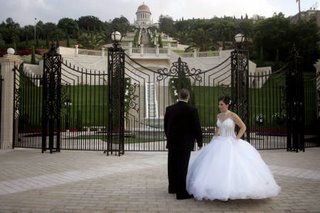Life is wierd, I have to admit. One time you look you are here with your friends but then just a year later you see that everything has changed, you hangd and moved, your friends got married or signed under the successful works or voluntary works.
Like one of my friend! Her name is Fulya Vekiloglu. We spent our years together in the same community, served together. It was not that long ago. Then I moved then she went to Afghanistan to help women. The life was tough there as she told me once, because of the situation. Well, last time when I saw her I was about to leave my home to serve in the Baha'i World Centre which was 2 years ago. Now, I just read that she is just arrived to NewYork for her new work in UN. I heard she just visited the Holy Places in Haifa before the war. I am happy for her and for the Baha'i community. Because I know how hard she works.
Good luck Fulya! :)
New Baha'i representative at the United Nations
 Fulya Vekiloglu, who joined the United Nations Office of the Baha'i International Community in New York as a representative to the United Nations in June 2006.
Fulya Vekiloglu, who joined the United Nations Office of the Baha'i International Community in New York as a representative to the United Nations in June 2006.Bringing wide-ranging experience in women's issues, civil society organization, and international development, Fulya Vekiloglu has joined the United Nations Office of the Baha'i International Community in New York as a representative to the United Nations.
A native of Turkey, Ms. Vekiloglu arrived in New York in June 2006. She will work alongside Bani Dugal, who is the Community's principal representative to the United Nations. Ms. Vekiloglu's focus will be on issues related to the advancement of women and social development.
"We consider ourselves very fortunate to have Ms. Vekiloglu on our team at the United Nations," said Ms. Dugal. "She brings with her a wealth of experience in some of the issues that concern the Community the most, specifically in the areas of women and children, as well as in social and international development, and civil society."
Before coming to New York, Ms. Vekiloglu worked as a project manager for the United Nations Development Programme (UNDP) in Afghanistan, where she managed an institutional capacity building program in the Ministry of Women's Affairs for three and a half years.
In that project, she provided direct support to the Ministry and trained more than 700 civil servants and representatives of non-governmental organizations (NGOs) from 10 provinces in Afghanistan on gender issues.
In 2001 and 2002, Ms. Vekiloglu worked as a consultant for the UNDP in Bosnia and Herzegovina on a project to survey civil society development in Eastern Bosnia. She also worked in Bosnia for an international project promoting conflict resolution and peace education.
Prior that, Ms. Vekiloglu worked extensively with civil society and women's organizations in Turkey. From 1999 to 2000, Ms. Vekiloglu served as the coordinator of a women's NGO networking project in Ankara, Turkey.
During the lead-up to and during the 1996 UN Conference on Human Settlements (Habitat II), Ms. Vekiloglu was a member of the National NGO Host Committee of Turkey. In that role, she also served as a member of the national Habitat II report committee for Turkey. She was also the founder and facilitator of the Habitat Women's Caucus (1997-1999) in Ankara for the follow-up on the Habitat Agenda.
A lifelong Baha'i, Ms. Vekiloglu also has an extensive record of service to Baha'i institutions. She served in the Baha'i community of Turkey's external affairs office from 1992 to 1995, and also directed the Habitat II Baha'i Office from 1995-1998.
Ms. Vekiloglu, 40, has a Master of Science degree in Gender and Women's Studies from the Middle East Technical University in Ankara and a Bachelor of Science in Industrial Product Design from Mimar Sinan University in Istanbul.
"Although I have had many incredible experiences working in the field, this new position at the Baha'i International Community is really exciting because it offers an opportunity to work on issues at the global level, directly at the United Nations," said Ms. Vekiloglu.
"I have lived in different communities with diverse religious and cultural backgrounds and have seen up close the lives, dimensions and experiences of women at the grassroots level," Ms. Vekiloglu added.
"Yet I have seen that they all speak with the same voice and thirst for a common equality, endeavoring as women and mothers to create better lives for their children and their communities.
"So often, people are pessimistic about the progress that is being made around the world," said Ms. Vekiloglu. "My hope is to be able to bring a positive outlook, based on these experiences, to our work at the United Nations and with other civil society organizations."






